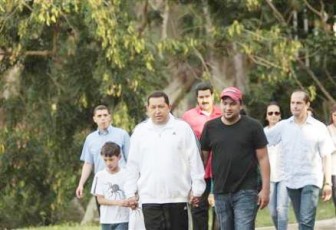CARACAS, (Reuters) – Smiling and embracing supporters, Venezuelan President Hugo Chavez flew home yesterday after surgery in Cuba for cancer that will require him to have radiation therapy ahead of October’s re-election bid.

Chavez’s presence on Venezuelan soil after an absence of more than three weeks in Havana should reassert his leadership, calm anxiety among supporters and quell whispers of a brewing succession struggle behind the scenes.
Yet little is known about what kind of cancer Chavez has or how serious it is. So big questions remain as to whether he is fit enough to campaign for an Oct. 7 election that has turned into the biggest political fight of his 13-year rule.
Flying into Maiquetia international airport, on the coast outside Caracas, the socialist leader warmly greeted Cabinet ministers and relatives before a military ceremony on the runway.
“This new return is a song, a prayer, a commitment to God!” an emotional Chavez said in a televised speech to the nation.
In news that stunned Venezuelans accustomed to Chavez’s energetic and all-dominant presence, Cuban doctors treated a pelvic abscess and removed a cancerous tumor in June 2011. Following those procedures, Chavez said he was “completely recovered.” But after a recurrence of the disease that dented his credibility regarding his health, Chavez flew to Cuba last month to have a second malignant tumor removed.
Upbeat as always, Chavez fired off a series of Tweets before he departed yesterday, saying he had bid farewell to his friend and political mentor Fidel Castro, the former Cuban leader.
“We had lunch with Fidel. He sent a gigantic hug to the whole Venezuelan people,” Chavez said.
“We will live and we will conquer!” he added, in what has become his signature slogan since he was diagnosed with cancer.
GUESSING GAME
Medical experts say the radiation treatment he faces could take a heavy physical toll. Chavez has denied rumors the disease has spread. The cancer saga has eclipsed all other matters in the South American country, with theories ranging from a belief by some that he has invented it to win sympathy, to speculation by others that he has only months to live.
Whatever his condition, the side effects of the radiation treatment will slow down Chavez’s traditionally gregarious, on-the-street style, just as his 39-year-old opponent, Henrique Capriles, is gearing up his own campaign.
Capriles, a former state governor, won a strong mandate in a primary election last month and is contrasting his energetic and youthful image with Chavez’s convalescence.
On the campaign trail this week, Capriles walked for hours under the sun, entered dozens of homes and shops to talk to Venezuelans, and enjoyed a game of basketball with locals.





